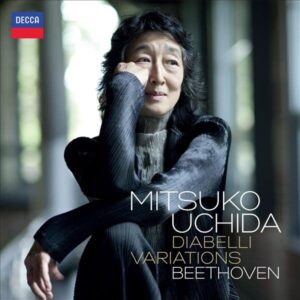In a 1970 overview of Beethoven Diabelli Variations recordings, my late colleague Harris Goldsmith divided the performances into three basic categories: One strives for large-scale drama, structural unity, and cumulative momentum (i.e. Artur Schnabel, Rudolf Serkin); another treats each variation as a separate structural and emotional entity (Paul Baumgartner, Hans Richter-Haaser); the third focuses on stimulating pianism first and foremost (Julius Katchen, John Browning). To Goldsmith’s point, I add performances that communicate on all three levels with equal success: Charles Rosen, Igor Levit, Andreas Staier, Daniel Shapiro, and Stephen Kovacevich’s digital remake. Mitsuko Uchida belongs to this illustrious group in regard to her assiduously organized tempo relationships, her painstakingly detailed characterizations, and her sophisticated virtuosity.
Following a brisk and carefully contoured exposition of Anton Diabelli’s waltz theme, Uchida generates tension within the obsessive funeral march dotted phrases in Variation 1 by giving dissonances their full weight and varying her articulation of accents and points of emphasis. She keeps No. 2’s alternating patterns between the hands on an even keel, disregarding the bar lines. No. 3’s expressive gestures occur where least expected. No. 5’s repeated-note upbeats are sprung with lilting restraint, while No. 7’s strategically delayed sforzandos achieve uncommon power and gravitas without sounding mannered. No. 10 may not go like the proverbial wind, yet the cross-rhythmic phrases take cogent shape and sound faster than they actually transpire.
Some listeners may feel that Uchida’s distentions of No. 13’s humorous short phrases convey an appreciably pompous edge, yet I prefer Charles Rosen’s more deadpan approach. She ever-so-slightly telegraphs No. 21’s sudden tempo changes, but her emphatic articulation of No. 22 (based on Mozart’s “Notte e giorno faticar” from Don Giovanni) has a deliciously sardonic effect. Uchida is meticulous to a fault in No. 23, which “bangs and scampers” rather gingerly. But the final minor-key variations are beautifully sustained. No. 32’s fugal textures could be more driving and vehement, yet Uchida’s understated simplicity and spacious repose in No. 33 represents a safe landing following a well-thought-out journey.
If Uchida’s Diabelli Variations don’t unfold so naturally as Rosen’s, nor match Levit’s supple gamesmanship or Rudolf Serkin’s nervous energy, she thoroughly realizes her conception in sound, with no barrier between ideation and execution. The Snape Maltings Concert Hall’s acoustics and Everett Porter’s engineering do Uchida’s well-regulated instrument justice, while Misha Donat’s excellent notes deserve mention. Well worth hearing.
































